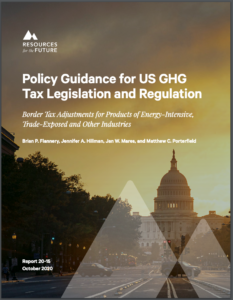Full Title: Policy Guidance for US GHG Tax Legislation and Regulation: Border Tax Adjustments for Products of Energy-Intensive, Trade-Exposed and Other Industries
Author(s): Brian Flannery, Jennifer A. Hillman, Jan Mares, Matthew C. Porterfield
Publisher(s): Resources for the Future
Publication Date: October 23, 2020
Full Text: Download Resource
Description (excerpt):
An increasing number of US senators and representatives are proposing legislation to address climate change based on a greenhouse gas (GHG) tax or “pollution fee.” Such proposals would create significant economic impacts on fossil fuel producers and energy-intensive industries that rely on them, especially those proposals that call for large tax increases over time to achieve the long-term goals of the Paris Agreement. Resulting cost increases for US industries with significant GHG emissions—typically referred to as energy-intensive, trade-exposed (EITE) industries—could cause some production to shift to countries without comparable carbon pricing policies, resulting in “leakage” of GHG emissions that the domestic tax aims to reduce and competitive disadvantages for domestic manufacturers competing with foreign firms not facing the tax (both in the United States and abroad in export markets). The impacts would include loss of jobs, business, and investment. In regions where such businesses play a central economic role, the impacts would spread to the entire community and supply chains that rely on them. Such concerns have led to proposals for US GHG policy to include border adjustments (BAs) in past and current proposed legislation. Specifically, in the case of a GHG tax—by imposing a charge on GHG-intensive imported products (based on the US tax) and providing rebates for the tax on the cost of similar products exported by US firms—border tax adjustments (BTAs) are intended to alleviate losses to domestic companies from changes in international trade.
